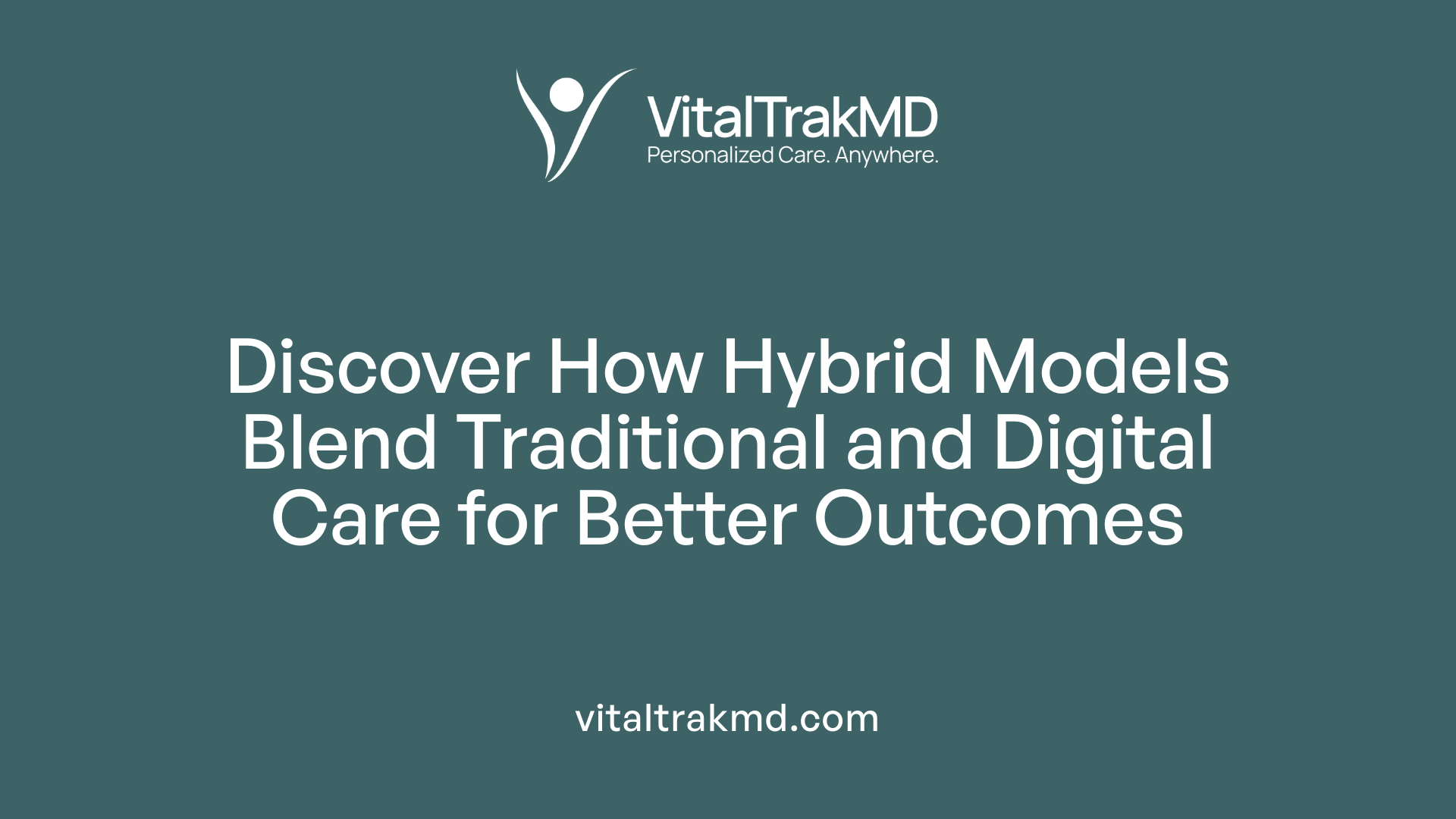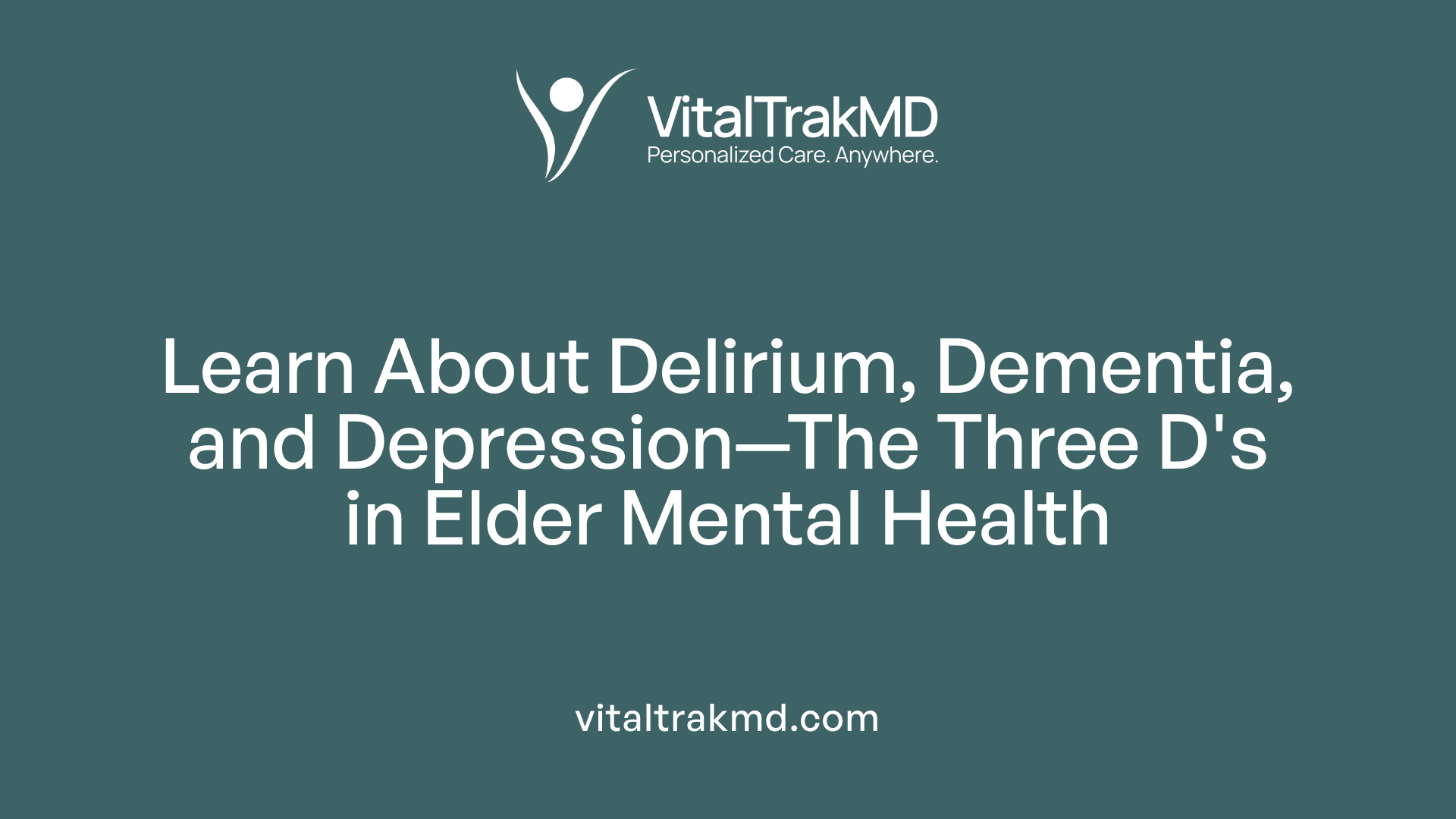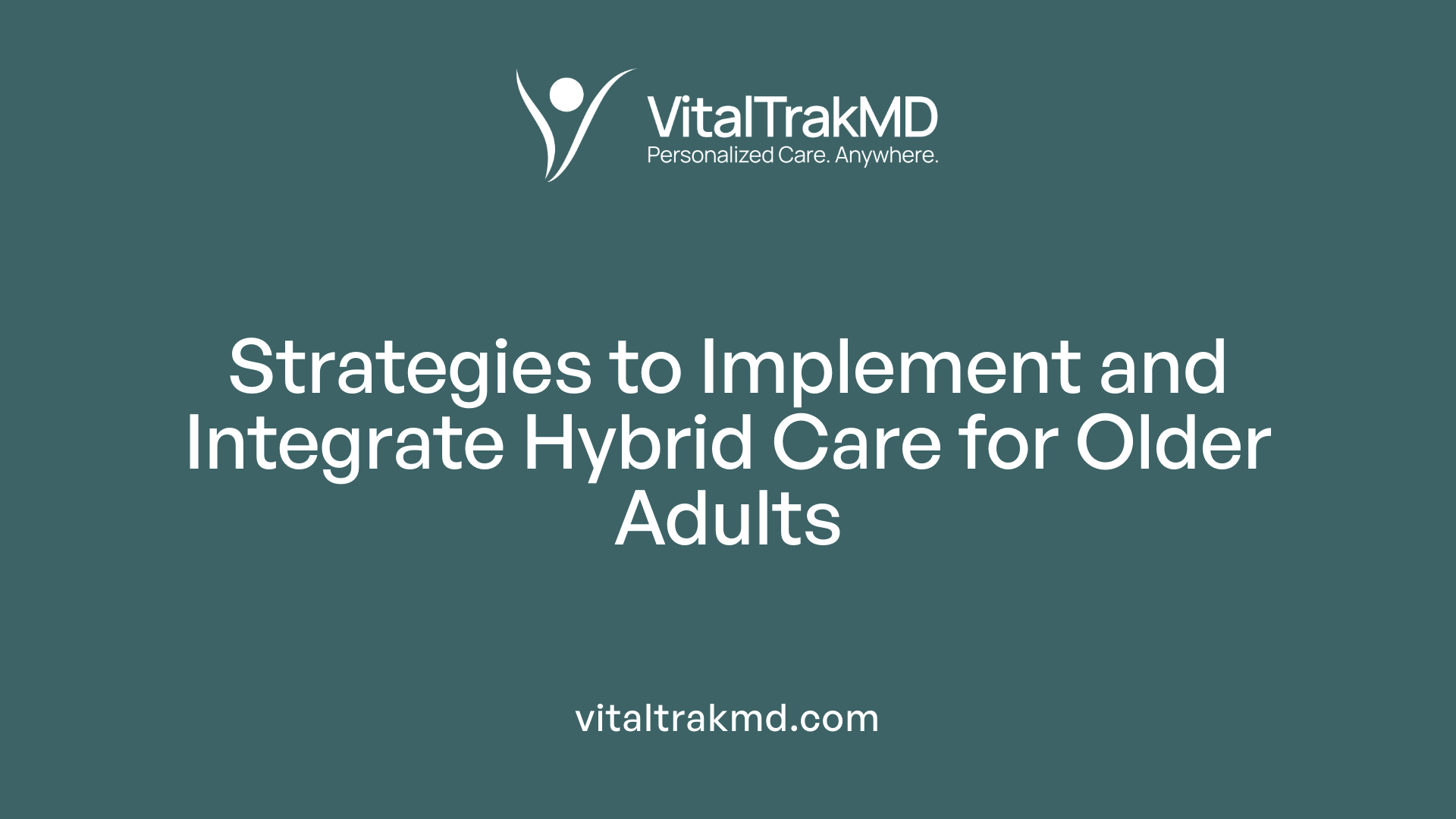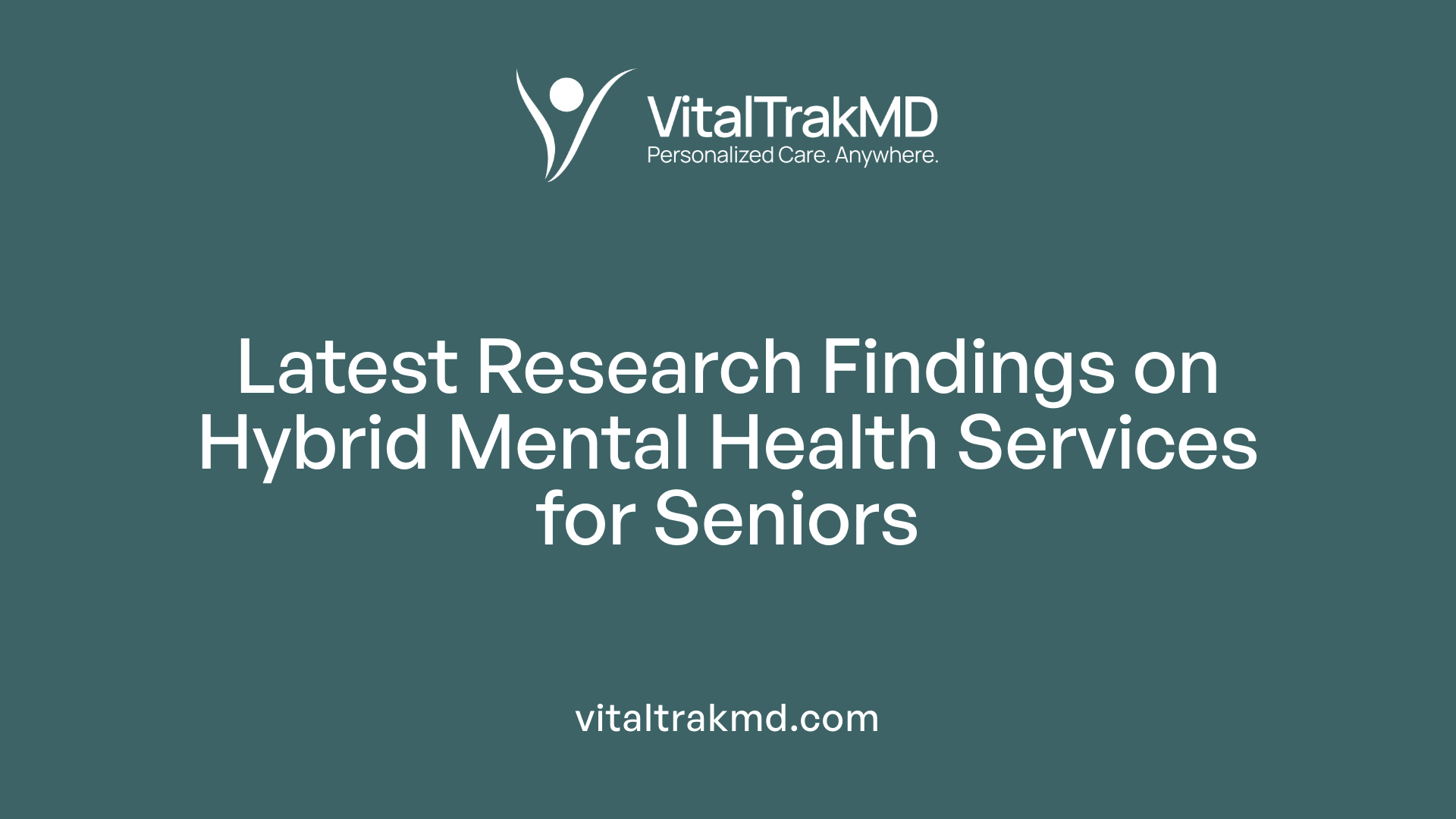Using Hybrid Healthcare for Mental Health Support in Seniors

Enhancing Mental Health Support for Seniors via Integrated Care Models
As the global aging population rises, innovative healthcare approaches are essential to meet the complex mental health needs of older adults. Harnessing the potential of hybrid healthcare models—blending in-person services with digital innovations—offers promising solutions to improve access, engagement, and outcomes. This article explores how multidisciplinary, community-based, and technology-driven strategies are transforming mental health support for seniors, emphasizing evidence-based practices and policy frameworks that foster inclusive, effective, and sustainable care.
Understanding the Hybrid Model of Mental Health Care

What is the hybrid model of mental health care?
The hybrid model of mental health care combines traditional in-person or telehealth therapy sessions with digital tools. These tools include smartphone apps, wearable devices, digital therapeutics, virtual reality, chatbots, and methods like digital phenotyping. This approach uses both real-time (synchronous) and on-demand (asynchronous) interventions to increase access, boost engagement, and tailor treatments to individual needs.
Human support plays a crucial role. Clinicians or digital navigators guide patients in using these digital tools effectively and help improve digital literacy. This model aims to serve a broad range of mental health conditions, including mood and anxiety disorders and serious mental illnesses.
By merging technological advances with traditional care approaches, hybrid models enhance the reach of mental health services, improve efficiency, and generate valuable data insights for better management and treatment outcomes.
Common Mental Health Challenges in Older Adults

What are the common mental health concerns faced by older adults?
Older adults frequently face various mental health challenges that can greatly influence their overall well-being and quality of life. The most common issues include depression, anxiety, and cognitive disorders such as dementia. These conditions are often underdiagnosed because symptoms may be mistaken for normal aging or dismissed as temporary.
Depression affects a significant portion of seniors, often resulting from factors like loss of loved ones, physical health problems, or social isolation. Anxiety disorders are also prevalent, sometimes triggered by health uncertainty or life changes. Cognitive disorders, including Alzheimer’s disease and other dementias, impair memory and decision-making, creating additional emotional and physical stress.
Social isolation and loneliness are critical factors that exacerbate mental health issues. Research indicates that loneliness affects up to 24% of seniors living in the community and can lead to increased risk of depression and other psychological distress.
Other psychological issues related to aging include grief, especially after experiencing the loss of close friends or family members, and problems stemming from chronic illnesses or elder abuse. These factors tend to elevate the risk for mental health conditions, complicating management and treatment.
Addressing these challenges necessitates a holistic approach that incorporates social, medical, and psychological support. Hybrid healthcare models—combining in-person visits with telehealth and digital tools—are increasingly utilized to improve access to care, promote early diagnosis, and encourage ongoing mental health management. Overcoming barriers such as stigma and limited healthcare access is crucial to ensure that older adults receive the mental health support they need.
Supporting mental health in older populations requires efforts spanning policy, community engagement, and personalized treatment plans aimed at fostering emotional resilience, social connectivity, and overall cognitive health.
More Information
To explore further on this topic, search for "mental health concerns aging population." This will provide additional insights into the specific issues, latest research, and innovative support strategies for mental health in older adults.
The Three D's of Geriatric Mental Health

What are the three D's of geriatric mental health?
The three D's of Geriatric Psychiatry—delirium, dementia, and depression—are among the most common and challenging diagnoses for older adults.
Delirium is a sudden change in mental status, often caused by infections, medications, or metabolic imbalances. Dementia involves a progressive decline in cognitive functions, impacting memory, reasoning, and daily functioning. Depression in seniors may be overlooked but significantly affects quality of life and can coexist with other chronic health issues.
Understanding these conditions is crucial for effective management. This requires a comprehensive, multidisciplinary approach that combines clinical assessment, social support, and appropriate treatment—areas increasingly supported by hybrid healthcare models, telepsychiatry, and caregiver involvement to improve outcomes for elderly patients.
For more information on the three D's and mental health in the elderly, searching "three D's mental health in elderly" can provide additional resources and recent research insights.
Advantages of Hybrid Healthcare Models for Elderly Mental Health

What are the benefits of hybrid healthcare models for elderly mental health?
Hybrid healthcare models combine in-person visits with digital health solutions, creating a versatile approach tailored for older adults. This integration significantly improves access to mental health services, especially for seniors who face challenges like transportation issues, mobility limitations, or living in remote areas.
One of the major benefits is increased patient engagement. The use of teletherapy, mobile apps, and virtual chat tools makes it easier for older adults to participate actively in their care without the burden of frequent travel. These digital tools also enhance adherence to treatment plans by providing consistent reminders, education, and remote monitoring, which helps maintain therapeutic momentum and reduce the likelihood of relapse.
Continuity of care is another vital advantage. Hybrid models ensure regular follow-ups through telehealth, even when in-person visits are difficult, such as post-hospital discharge or after emergency visits. This ongoing support means early intervention opportunities that can improve outcomes and stability.
Furthermore, hybrid healthcare helps mitigate workforce shortages. Tele-nursing and virtual support create opportunities for mental health professionals to extend their reach, address high caseloads, and reduce burnout among providers. This efficiency allows more seniors to receive timely and personalized care.
In summary, hybrid mental health approaches offer flexible, accessible, and personalized services. They are particularly suited to meeting the diverse and complex needs of seniors, fostering better mental health management and enhancing overall well-being.
Implementing and Integrating Hybrid Mental Health Care for Seniors

How can hybrid mental health care be implemented and integrated for seniors?
Hybrid mental health care combines in-person services with digital health solutions like telepsychiatry, remote monitoring, and online resources to improve access and effectiveness for older adults. Its successful implementation starts with embedding evidence-based practices such as collaborative care models and chronic care frameworks within primary care and community settings.
Healthcare providers should undergo specialized training to effectively deliver these integrated services. This includes understanding telehealth technologies, mental health assessments, and culturally competent care tailored to seniors’ unique needs.
Technology plays a central role in expanding access. Telepsychiatry, mobile apps, and remote therapy help reach homebound or rural seniors, improving engagement and adherence. Embedding mental health services within familiar community settings like senior centers or home visits by community health workers creates a comfortable environment for older adults.
Developing stable and supportive payment systems and policies is crucial to sustain these hybrid models. Policy adjustments that reimburse telehealth services equally with in-person visits encourage providers to adopt hybrid care approaches.
Cross-sector collaboration is essential. Partnerships among healthcare, social services, and community groups enable comprehensive, person-centered care. Engaging family members and caregivers further enhances support and adherence.
Monitoring and evaluating outcomes through regular data collection help refine these models. Tracking metrics like patient satisfaction, symptom improvement, and service utilization guides ongoing improvement.
In sum, effective hybrid mental health care for seniors requires a well-planned integration of evidence-based practices, provider training, adequate financing, community engagement, and continuous outcome assessment. Tailoring these approaches ensures accessible, acceptable, and impactful mental health support for older adults.
The Critical Role of Telepsychiatry and Digital Interventions

What role do telepsychiatry and digital interventions play in hybrid mental health care for seniors?
Telepsychiatry and digital tools are transforming how mental health services are delivered to older adults. These approaches are crucial in expanding access, especially for seniors facing geographical, mobility, or transportation barriers.
Telepsychiatry via videoconferencing offers a reliable and satisfying experience for seniors. It allows clinicians to perform comprehensive assessments, provide diagnoses, and deliver therapy without requiring in-person visits. Studies show that outcomes achieved through telepsychiatry are often comparable to traditional face-to-face care.
In addition to telepsychiatry, various digital tools support ongoing self-management and symptom monitoring. Mobile apps, chatbots, and virtual reality platforms are increasingly used to help seniors manage stress, improve mood, and foster social connections. These tools can be customized to meet the unique needs and preferences of older adults, making mental health care more engaging and accessible.
To ensure optimal engagement, many programs incorporate digital navigators or clinicians who guide seniors through technology use, troubleshoot issues, and personalize treatment plans. This human support boosts confidence and helps overcome barriers like unfamiliarity with technology or privacy concerns.
Overall, hybrid models combining telepsychiatry and digital interventions significantly improve access to mental health care, enhance patient satisfaction, and support better outcomes for seniors. Despite some challenges related to technology use and privacy, these innovations represent a promising direction for aging populations' mental health support.
Research on Effectiveness of Hybrid Mental Health Services in Seniors

What are the research findings on the effectiveness of hybrid mental health services for older adults?
Recent studies show promising results for hybrid mental health services catering to seniors. These programs, which combine face-to-face interactions with digital or remote interventions, have demonstrated comparable benefits to traditional in-person care.
Participants in hybrid models often experience increased engagement and social support, helping to reduce feelings of loneliness and isolation that are common among older adults. Moreover, symptoms such as depression, anxiety, and other mental health issues tend to improve with these flexible approaches.
Research highlights that the success of hybrid care depends on several factors. Strong therapeutic support, personalized treatment content, and addressing specific barriers like digital literacy and privacy concerns are crucial. For example, programs that integrate caregiver involvement and tailored digital tools tend to yield better outcomes.
Acceptance among older adults is generally high, especially when the services are user-friendly and provide consistent, accessible support. As a result, hybrid mental health services are increasingly seen as sustainable and effective options for improving mental health, enhancing treatment adherence, and delivering personalized care.
Overall, evidence suggests that hybrid approaches can significantly enhance mental health management in seniors, bridging gaps in access and providing flexible, patient-centered support.
Barriers and Facilitators in Adopting Hybrid Healthcare for Seniors
What are common barriers and facilitators to adopting hybrid healthcare models for senior mental health?
Implementing hybrid healthcare models for older adults experiencing mental health issues involves navigating various challenges and opportunities. Barriers often stem from technological, social, and systemic factors.
A primary obstacle is the digital divide. Many seniors face limited access to modern technology due to socioeconomic constraints, such as low income or lack of infrastructure. Additionally, low digital literacy can hinder their ability to effectively use telehealth platforms or digital health tools.
Sensory impairments—like poor eyesight or hearing loss—and cognitive deficits further complicate the use of digital solutions. These challenges make navigating apps, platforms, or devices difficult without proper support.
Cultural attitudes also influence adoption. Ageism, mental health stigma, and misconceptions about technology can discourage seniors from engaging with hybrid models. Privacy concerns about data security add to hesitations, especially among those unfamiliar with digital privacy protections.
Systemic issues pose additional barriers. Workforce shortages of trained providers, complex regulations, insufficient infrastructure, and limited funding cuts hinder scale-up and equitable access.
Despite these challenges, facilitators can promote successful adoption. Strong social support from family, caregivers, and healthcare teams encourages engagement and persistence.
Person-centered, culturally sensitive care that respects individual preferences helps build trust. Making technology user-friendly with simple interfaces and accessibility features eases use.
Positive prior experiences with digital tools boost confidence. Policy reforms that improve broadband access, digital literacy programs, and funding for supportive services are crucial systemic enablers.
Addressing both individual barriers through tailored education and systemic issues via policy change can significantly improve the uptake of hybrid healthcare for mental health in older adults. These strategies promote inclusivity, improve health outcomes, and support aging in place in a rapidly evolving healthcare environment.
Community-Based Hybrid Programs and Self-Management Strategies
How do community-based hybrid healthcare programs and self-management strategies support senior mental health?
Community-focused hybrid healthcare programs significantly enhance mental health support for older adults by fostering a sense of connectedness, empowerment, and resilience. These programs, like the Community Health Social Partnership Program (C-HSPP) and the Health Social Partnership Program (HSPP), offer personalized and interdisciplinary interventions tailored to seniors’ unique needs.
At the core of these initiatives is the emphasis on peer support and social engagement, which combat social isolation—a major issue affecting up to 43% of seniors. By encouraging social participation and peer connections within community settings, these programs help reduce feelings of loneliness and depression.
Incorporating technological tools such as mobile apps and remote health monitoring enables older adults to actively manage their mental health. These tools support goal-setting, health tracking, and self-care education, empowering seniors to take charge of their well-being.
Care approaches are grounded in ecological and recovery frameworks, addressing individual goals while integrating health and social services seamlessly. This comprehensive support system nurtures resilience and promotes recovery, especially important during transitions like post-hospitalization or dealing with chronic conditions.
By creating accessible environments with flexible, tailored services, community-based hybrid programs help improve mental health outcomes. They encourage self-efficacy, facilitate social bonds, and provide ongoing support, ultimately contributing to a holistic approach that sustains mental well-being in older adults.
More information search query: community hybrid programs seniors
Patient Perspectives and Trust in Hybrid Mental Health Care
What are patient perspectives and trust issues related to hybrid mental health care in seniors?
For older adults, trust plays a vital role in the acceptance and success of hybrid mental health services, which blend in-person and digital care approaches. Many seniors appreciate the convenience and privacy that digital tools can offer, especially when managing mental health conditions like depression, anxiety, or auditory hallucinations. These technologies can facilitate better communication with providers, promote self-reflection, and support ongoing monitoring.
However, trust issues often arise due to concerns about privacy, data security, and surveillance. Older adults worry about who has access to their sensitive health information and whether their digital interactions are secure. Additionally, stigma around mental illness and discomfort with unfamiliar technology can create barriers, reducing their willingness to engage with hybrid care options.
Familiarity and previous relationships with healthcare providers significantly influence trust. Seniors tend to feel more comfortable when they already trust their clinicians, making them more open to incorporating digital interventions into their treatment plans.
Sensory impairments, low digital literacy, and lack of access to reliable internet further challenge trust and participation. To enhance engagement, healthcare providers should focus on clear communication, ensuring data privacy, and providing support for technological setup and use.
Ultimately, combining sensitive interpersonal interaction with secure and user-friendly digital solutions helps foster trust. Addressing these concerns is essential to optimize the benefits of hybrid mental health care for the elderly, ensuring they feel supported, respected, and confident in using innovative care models.
Moving Forward with Hybrid Mental Health Strategies in Geriatric Care
The integration of hybrid healthcare models in elderly mental health support holds tremendous promise for creating more accessible, personalized, and effective services. By embracing innovative technologies, fostering community partnerships, and ensuring equitable access, healthcare providers can better meet the complex needs of aging populations. Overcoming barriers related to digital literacy, privacy, and systemic limitations requires concerted efforts, policy support, and ongoing research to refine best practices. As evidence continues to endorse the safety and efficacy of hybrid mental health care, the future of geriatric psychiatry is poised for transformative improvements—ultimately promoting mental well-being, resilience, and quality of life for seniors across diverse settings.
References
- Mental health care for older adults: recent advances and new ...
- Hybrid Telepsychiatry: A United States Perspective with Relevance ...
- What Is Hybrid Healthcare? Tools, Benefits, and Solutions for Success
- Closing the gap: Organizations move to telepsychiatry and hybrid ...
- Mental Health Support for the Elderly - Nautilus Senior Home Care
- Increasing access to rural mental health care using hybrid care that ...
- [PDF] Supporting the Mental Health Needs of Older Adults | SAMHSA
- A health-social service partnership programme for improving the ...
- Actualizing Better Health And Health Care For Older Adults
Recent articles
Want to Feel Better and Live Healthier?
Join hundreds of patients taking control of their health with personalized care that fits their life – not the other way around.
Rated 4.8/5 by 32+ customers







